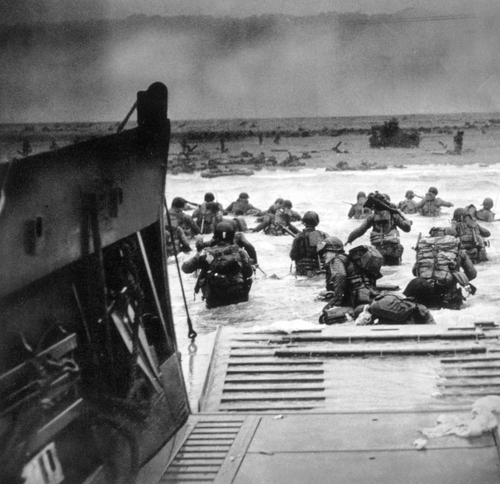One of the many great scenes from Mel Brooks’ magnum opus “The Producers” occurs when the airheaded director would-be producers Zero Mostel and Gene Wilder choose to helm “Springtime for Hitler,” demonstrating beyond a reasonable doubt he is void of any knowledge about something that, in 1968 when the movie was made, was still considered one of the most profound historical moments in human history — World War II.
That scene was a little less funny when I found myself in conversation with a millennial and I brought up the recent 75th anniversary of the D-Day Invasion in Normandy. From the nonplussed look on this person’s face I got the clear indication he had no idea what I was talking about. I realized then and there it may not be the profound historical moment I once thought it was, so we went back to a conversation about social media.
Though our Savior instructed us to let the dead bury the dead, the more I thought about my millennial encounter, the more I thought about the Old Testament story of how Saul’s mutilated body was rescued and purified and buried with honor. Praying for the dead and honoring those who have gone before us is integral to our faith.
Growing up in a large family, with uncles and cousins who had fought in the Second World War, also gave me a perspective my young acquaintance could not avail himself to. And when I was growing up during the age of television that was hungry for product to show, old war movies were a staple, and my friends and I just couldn’t get enough of them. Most of these movies were propaganda films designed to make the home front feel better, and their creators had no idea they would also serve to enthrall an army of young boys growing up in the 1960s where the war was far enough in the past as to be an abstraction, rather than the cavalcade of horror which all wars are.
Maybe those old movies served me well after all, having instilled in me a curiosity about the past and a need to know more about it. Consider it my “gateway” drug for becoming a history geek.
The millennial who knew nothing of the great sacrifice made by the men at Normandy 75 years ago probably knows less about the upcoming 50th anniversary of the first manned exploration of the moon and he, and our culture in general, will be all the poorer for that ignorance.
History is all about context, and history tells us not just what is in our past but what we might expect in our future. If I could pontificate, it is the culture’s responsibility — yes, even the popular culture — to facilitate that kind of responsibility. Without historical context the Vatican wrestling match with the Chinese Communist regime, which was fed, watered, and came to flower only four years after the end of World War II, is harder to understand. In the Middle East, the historical context goes even further back. The early 1960s David Lean epic “Lawrence of Arabia,” though a fanciful tale of an enigmatic man, is dripping with the bitter realities that created the region that today is synonymous with strife.
And it was within the cauldron that was World War II in Europe where St. John Paul II and Benedict XVI’s young adulthoods were shaped — some might even suggest they were forged. When they came out at the other end, they became the leading voices in Church renewal, architects of Vatican II, and eyewitness reporters of the evils of both nationalist and internationalist socialism.
My millennial friend can run circles around me on an iPhone. But I had biblical epics on late night TV. Although it is probably safe to assume Israelites and Philistines in 1000 BC did not much look like Victor Mature, Angela Lansbury, and George Saunders, these kinds of movies, just like the sanitized war movies, opened the door of my imagination and led me to seek more. And as with so many things, the “book” is more interesting and compelling than the movie.
The more I think about the chasm that continues to grow between popular culture and our historical memory, it brings me back to “The Producers” and that ever inept director of “Springtime for Hitler,” Roger DuBois when he exclaimed, “And that whole third act has got to go…They’re losing the war!”
Sadly, when it comes to the cultural war, we may indeed be losing.
Robert Brennan is a weekly columnist for Angelus online and in print. He has written for many Catholic publications, including National Catholic Register and Our Sunday Visitor. He spent 25 years as a television writer, and is currently the Director of Communications for the Salvation Army California South Division.
Start your day with Always Forward, our award-winning e-newsletter. Get this smart, handpicked selection of the day’s top news, analysis, and opinion, delivered to your inbox. Sign up absolutely free today!

